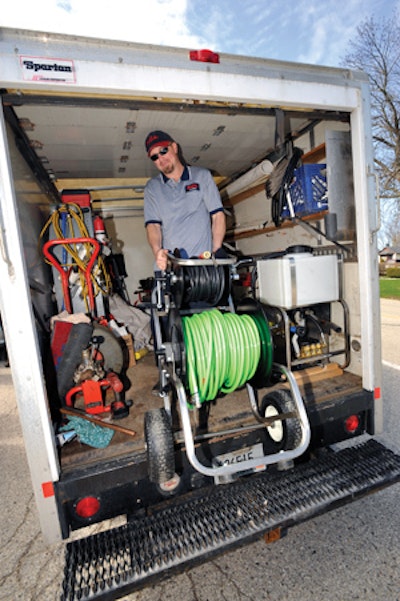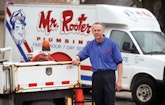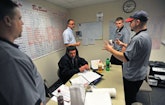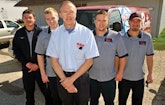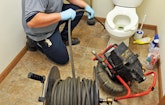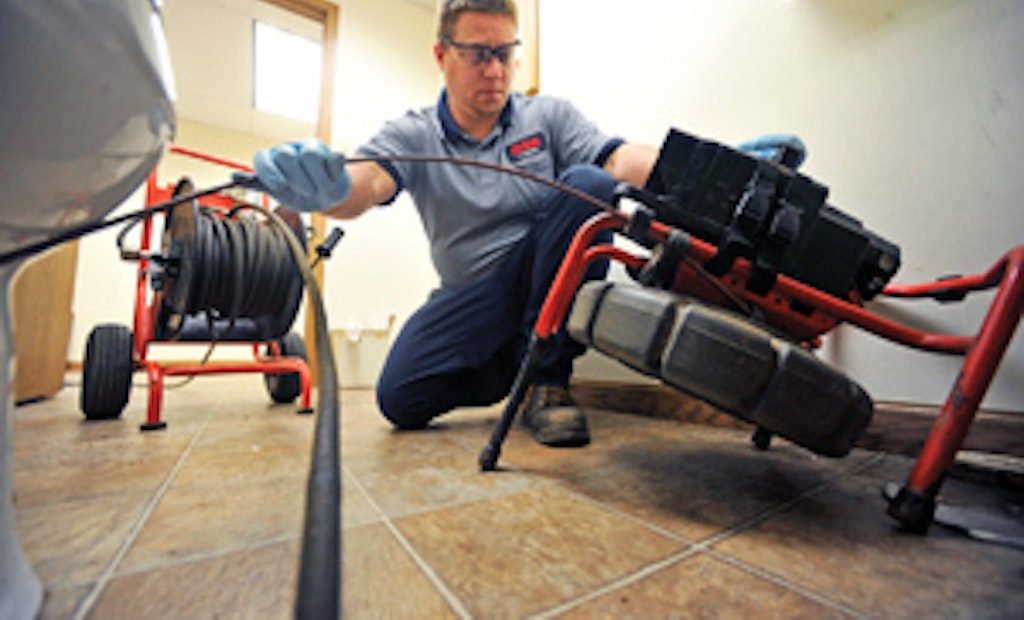
Interested in Plumbing?
Get Plumbing articles, news and videos right in your inbox! Sign up now.
Plumbing + Get AlertsReinvention is the name of the game for John Donovan. During the past four years, he has changed the course of his business from bidding on plumbing installation contracts to providing drain cleaning and general plumbing services as owner of Mr. Rooter of Southeast Wisconsin.
Donovan’s journey included learning about and buying drain service equipment, adopting a customer-service mindset and surviving the Great Recession of 2008-09. “I was delightfully naïve about what I needed to know,” he says. “Fortunately, I learned very quickly.”
Today he has seven employees and a fleet of four well-equipped service vehicles and provides drain- and sewer-related services that include cleaning, waterjetting, and cured-in-place pipe lining. His robust marketing program includes both traditional directory advertising and ventures online with a website and presences on social networking sites.
Apprentice to entrepreneur
While he didn’t think of it at the time, Donovan, 49, had reinvented himself before he started his business. In the early 1990s, he left a job as traffic manager at a manufacturer to join the five-year apprenticeship program of the Plumber Union Local 75 in Milwaukee. “It seemed like a good opportunity to control my own future and career,” he says. “I felt the need to do something different.”
After working at two Milwaukee-area mechanical contractors and achieving master plumber status in 2003, Donovan started Donovan Plumbing, handling commercial and residential installations and remodeling. In about 2006, he started to see glimmers that the region’s construction boom couldn’t be sustained, especially when the buzz among contractors and subcontractors was about the possibility of lenders foreclosing on weak projects.
So, when representatives of The Dwyer Group, owner of the Mr. Rooter franchise organization, contacted him that summer, Donovan listened. He thought diversifying into residential drain cleaning and general plumbing would be a good long-term strategy, and he believed access to a national brand and its advertising, training, operating procedures and dispatching software would provide a head start.
By December, Donovan launched Mr. Rooter of Southeast Wisconsin, covering a three-county area. His journey was just starting.
The learning curve
Donovan had to get used to the idea of serving an 80 percent residential customer base and building repeat business instead of just bidding on one-time jobs. “The contractor doesn’t always speak the customer’s language,” he says. “But, when you’re running a service-oriented business, it causes you to meet and relate to people. I’ve found I really like that.”
Donovan also quickly saw that he needed to devote time to business development. “In a little company when you’re busy, you’re not generating new business,” he says. “You’ve got to be paying attention to that. I think that’s a hard thing for a tradesman to put his head around.”
Donovan’s learning curve also included buying and equipping a service truck from the ground up. “The biggest shocker was buying cameras,” he says. “As a contractor, that was something I hadn’t used. They’re highly recommended to diagnose problems and share the information with customers. I’m glad I have them.”
A fully equipped service truck was a $55,000 outlay, including decals and paint. Donovan financed his first truck through his bank and bought the tools and equipment on his own. Mr. Rooter of Southeast Wisconsin now runs four service trucks – a Chevrolet 1-ton cube van, a GMC 1-ton cube van and two GMC service vans. The equipment roster includes:
Three RIDGID compact color cameras
Two RIDGID Scout locators
Two Mini SeeSnake cameras from RIDGID
A PROVision 2.0 camera from Spartan Tool LLC
Five drum machines from RIDGID (a K-7500, two K-6200s and two K-3800s)
Four cable machines from Spartan Tool (a Model 2001, two Model 81s and a Model 100)
A model J3080 jetter from General Pipe Cleaners (3,000 psi/8 gpm)
A model KJ-3000 jetter from RIDGID (3,000 psi/4 gpm)
A trailer-mounted model jetter from US Jetting (4,000 psi/18 gpm)
A MaxLiner lateral lining system from PrimeLine Products
Bottoming out
The company’s first year was busy and successful, and Donovan enjoyed the problem-solving aspect of drain cleaning. He added a second service truck in summer 2007 and planned to phase out his bid contract work over 18 months.
“We started out with a bang. I was very excited. Then, it got really, really scary,” he says. Service call volume started to drop off in the second quarter of 2008 and didn’t recover for nearly a year. Donovan continued with bid work for remodeling and plumbing upgrade projects, but those dried up by the end of 2008.
To maximize cash flow, he stretched out payments to vendors to 60 days and worked out a temporary rent reduction from his landlord. That allowed him to retain his three full-time and two part-time employees. Next, finding that his four skid-mounted jetters lacked the cleaning power he needed, Donovan sold two of them and bought his trailer jetter.
“I couldn’t sleep when I first decided to buy it, but it turned out to be a life-saving decision,” he says. “We would have been out of business if not for that jetter. I really believe that.” Besides using it for his own work, Donovan subcontracts it to other area plumbers. Equipped with a Warthog nozzle (StoneAge), the unit is very effective on roots. It enabled him to triple his sewer cleaning volume.
Nevertheless, 2009 was a lean year as residential customers chose to delay all but emergency plumbing projects.
Silver linings
The next year was surprisingly better, and Donovan began to expand again and chart a new growth path. Today, the firm has four technicians, an office manager/dispatcher, and an employee who assists with dispatch and coordinates marketing, including managing the website. Recently, the company began using Facebook and Twitter to stay in touch with customers.
Yellow Pages directory advertising accounts for about two-thirds of the company’s marketing budget, and the rest goes for Internet and direct mail. Donovan expects the website and online advertising to prevail eventually.
“Because there are such high numbers of homeowners, there is still an emphasis on the Yellow Pages,” he says. “About 60 percent of our new customers come through the Yellow Pages because that’s where people tend to go in an emergency. But the under-40 demographic has huge potential, and they are more oriented to the Internet.”
Donovan is selective when hiring technicians. “A technician who works for us has to be a people person with terrific people skills,” he says. “You have to be a listener, a detective and a mechanic. That’s not always an easy combination to find.” He has had success recruiting from the Craigslist website and from his technicians’ referrals. One departing technician referred his own brother for a job.
The technicians have individual annual sales and service goals for earning bonuses. “It’s important that they’re successful today so we’ll have success for the future,” Donovan says.
Lessons learned
Donovan calls the 2008-09 recession, “a real business education. Today, I think we’re better off for it.” Among the lessons learned:
Be there for your customers. “To me, nothing is more sacred than answering the customer call. If you really want to be in business, you’d better have you or your people answering the phone.”
Invest quality time in your business. To keep from getting caught up in day-to-day issues, he blocks out time each week for planning and assessment.
Be willing and able to change with conditions. “The market changed dramatically and we had to change with it.” Consumers who once were satisfied with good service now expect providers also to deliver value, such as maintenance advice.
Pay attention to the dollars. His highest priority is to maintain a cash reserve to cover two months of payroll expenses.
Donovan knows he has more to learn. In early 2011, he enrolled in a short course from the local Service Corps of Retired Executives (SCORE) chapter on creating balance sheets and profit-and-loss statements. “I don’t think I’ll ever stop learning,” he says.
